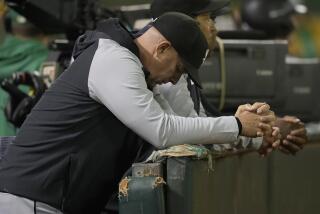Herzog Resigned to Facts : Cardinals: He quit last year as manager when he couldn’t look key players in the eye.
- Share via
ST. PETERSBURG, Fla. — Whitey Herzog, who resigned as the St. Louis Cardinals’ manager last July, remains a vice president with the club, but his office is on the fairways and at the fishing ponds near his St. Louis home.
He has received managerial feelers, but would like what he once had with the Cardinals--the power and authority to build a team, perhaps a National League expansion team.
“I’d like to be able to put a team together again, to be an Al Davis,” he said, referring to the Raiders’ owner. “But I don’t know if I’ll ever have the free reign that Gussie Busch gave me, at least in my first five years in St. Louis. I probably had more power than any manager since Connie Mack.
“It was a lot of fun, a lot of hard work. I was never off the phone.”
Significantly responsible for the early development of the New York Mets as their personnel director, Herzog joined the Cardinals as both field manager and general manager in 1980 and quickly built the team that won three pennants during that decade, missing a fourth because of the 1981 players’ strike.
But his authority, Herzog said, began to erode as failing health struck his benefactor, Busch, in the second half of the 1980s and corporate executives at Anheuser-Busch took stronger financial interest in the Cardinals.
The situation came to a head last year when Willie McGee, Vince Coleman, Terry Pendleton and Ken Dayley were among a nucleus of Cardinals eligible for free agency, and Herzog, in his own words, felt powerless as their manager because the players knew they weren’t going to be re-signed.
“We always had that Punch and Judy offense, we always had to scratch for runs,” he said. “But if we weren’t going to re-sign those players, I felt I couldn’t look them in the eye and ask them to do the little things we always had to do because it might cost them 10 points off their batting averages and that might cost them $3 million as free agents.
“We had a half-season to go, and I felt powerless--that it would be very hard to win, to get back in the race. I felt like I was suddenly trapped in the middle and I didn’t like it. I felt I was in a no-win position.”
The Cardinals were 33-47 when Herzog resigned and eventually finished last for the first time since 1918. General Manager Dal Maxvill describes the current transition as a youth movement, a necessary rebuilding process. Herzog would describe it as ongoing belt tightening.
“We were selling 3 to 4 million tickets,” he said. “It wasn’t like we were going broke or that we were an old team. I felt that if we could keep the team together and sign just one free-agent hitter, we could continue to contend.”
And now?
“I think they’ll have a terrible time scoring runs; I think the kids will have a real struggle the second or third time around the league,” he said. “I don’t think they have enough punch to contend in a division with the Cubs, Pirates, Mets and Expos, and that’s a shame because the fans have been loyal and deserve a winner.”
Did he attempt to talk the Cardinals out of the course that led to his resignation?
“No, I never disagree with ownership,” he said. “And I’m not saying that what the Cardinals and Astros have done is wrong. I’m just saying that it will be hard for them to compete because the other 24 teams haven’t done what they’ve done. If they did, you’d have 26 expansion teams and the owners would all be billionaires.”
More to Read
Go beyond the scoreboard
Get the latest on L.A.'s teams in the daily Sports Report newsletter.
You may occasionally receive promotional content from the Los Angeles Times.










